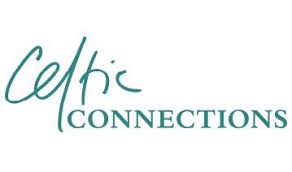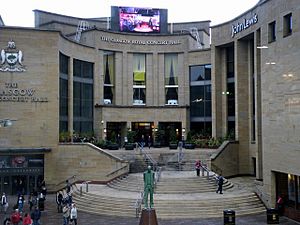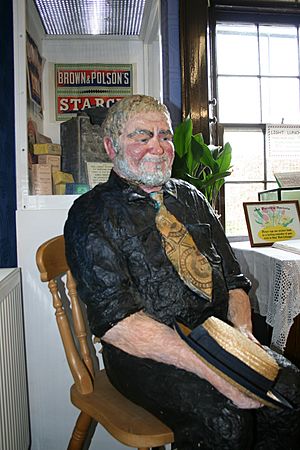Celtic Connections facts for kids
Quick facts for kids Celtic Connections |
|
|---|---|
 |
|
| Status | Active |
| Genre | Festival of Scottish folk music |
| Dates | 18 days in January / February |
| Frequency | Annually |
| Venue | Glasgow Royal Concert Hall |
| Location(s) | Glasgow, Scotland |
| Coordinates | 55°51′52″N 4°15′11″W / 55.864503°N 4.252921°W |
| Country | United Kingdom |
| Inaugurated | 1994 |
| Founder | Colin Hynd |
| Most recent | 2025 |
| Attendance | 130,000 |
| Capacity | 25,000 |
| Artistic Director | Donald Shaw |
| Organised by | Glasgow Life |
The Celtic Connections festival is a big music event that started in 1994 in Glasgow, Scotland. It happens every January and February. The festival features over 300 concerts, ceilidhs (traditional Scottish parties with music and dancing), talks, and workshops. It focuses on traditional Scottish music, but also includes folk, roots, and world music from around the globe. Glasgow Life organizes and promotes this popular festival. Donald Shaw, a musician from the band Capercaillie, became the Artistic Director in 2006.
A key part of the festival is its Education Programme. Thousands of school children attend free morning concerts. They get to experience live music, from traditional Scottish songs to blues. Celtic Connections also helps new and young musicians. It does this through its Young Tradition and New Voices concerts, and the Danny Kyle Open Stage competition.
After the main concerts finish each night, the Celtic Connections Festival Club opens. Musicians from the festival often play together in special, unplanned performances.
Contents
Discovering the Festival's History
The Celtic Connections festival was created by Colin Hynd in 1994. He wanted to fill a quiet time at the Glasgow Royal Concert Hall after Christmas. Colin Hynd aimed to create a festival with many types of music, from traditional to more modern styles. He promoted it on BBC Radio Scotland. The first festival attracted 33,000 people. All events in that first year were held inside the Glasgow Royal Concert Hall.
In 1995, the festival grew, with 130 events and over 50,000 visitors. It still focused on the Concert Hall but also used another nearby venue. By 1996, the festival expanded to more locations around Glasgow. It even included a Cajun music festival and a late-night club. A special performance that year brought folk and classical music together, which became a unique part of the festival.
By 1997, attendance reached 61,000 people. The festival continued to grow, bringing in many different artists. In 2008, Celtic Connections celebrated its 15th birthday. Festival attendance reached 120,000, with events happening across 14 venues in Glasgow over 19 days.
Celtic Connections brings visitors from all over the world to Glasgow. It is an important part of the city's culture. The festival also helps connect artists and cultures from different countries. Showcase Scotland, an event within the festival, brings music industry experts from many countries to Scotland. They look for Scottish bands to book for festivals abroad.
By 2020, the festival had over 300 events in 29 different venues. It reported 130,000 attendees, with a daily capacity of 25,000 people. Donald Shaw, the artistic director, continued to be a key spokesperson for the festival.
Festival Venues: Where the Music Happens
The main place for the festival is the Glasgow Royal Concert Hall. Performances and workshops happen in every part of this building. Other places that often host Celtic Connections concerts include the Old Fruitmarket, City Halls, Barrowland Ballroom, Tron Theatre, Mitchell Theatre, National Piping Centre, Tramway, the Mackintosh Church, St Luke's, and Òran Mór.
In the past, events have also been held at places like the O2 ABC, the Classic Grand, King Tut's Wah Wah Hut, the King's Theatre, the Tall Ship, The Arches, and Glasgow Cathedral.
Popular Festival Features
Transatlantic Sessions: A Musical Journey
Transatlantic Sessions started as a TV show in 1995. The idea was to bring traditional musicians from the US, UK, and Ireland together to create music. Aly Bain and Jerry Douglas led these sessions. At Celtic Connections, the Transatlantic Sessions concert brings together musicians from these countries and sometimes others. It has a house band, usually the same musicians each year, plus guest artists. This feature first appeared at the festival in 2004 and has been an annual highlight ever since. It often sells out very quickly.
Regular musicians in the house band include Aly Bain, Phil Cunningham, Michael McGoldrick, John McCusker, John Doyle, Jerry Douglas, Russ Barenberg, Donald Shaw, and James Mackintosh.
Roaming Roots Revue: Special Music Themes
The Roaming Roots Revue became a yearly event at the festival starting in 2013. It is put together by Roddy Hart & The Lonesome Fire. This show features guest artists who work together to create a unique performance based on a chosen theme. For example, in 2019, the theme celebrated the 50th anniversary of The Beatles' album Abbey Road. It included artists like KT Tunstall and The Staves. Other themes have explored the music of Laurel Canyon and celebrated Bruce Springsteen.
Supporting New Talent
The festival helps new and upcoming musicians through several regular programs.
New Voices: Original Music Commissions
New Voices (Celtic Connections musical commission) The New Voices series gives musicians a chance to create and perform new, original pieces of music.
Danny Kyle Open Stage: A Showcase for New Artists
The Danny Kyle Open Stage is a competition and showcase for new musical talent. It happens almost every day during the festival in the late afternoon, and it's free to attend. Five acts, either solo artists or bands, perform a short set. The six best acts from these daily shows are invited to a final competition on the last day of the festival. The six finalists are then offered a chance to perform at the next year's festival. All these concerts are broadcast live on Celtic Music Radio.
Danny Kyle first started a competition at the festival in 1998, the year he passed away. It has continued under his name ever since. Past winners include Malinky (which included Karine Polwart), Breabach, and Talisk.
Celtic Connections on Campus: University Concerts
Since 2015, free lunchtime concerts called Celtic Connections on Campus have taken place at Glasgow Caledonian University. These concerts are part of the festival but are fully organized by the university's Audio Technology students and staff. The performers must be current students at a college, university, or school, or recent graduates. These concerts are also broadcast live on Celtic Music Radio.
BBC Radio Scotland Young Traditional Musician: A Grand Final
The final concert of the BBC Radio Scotland Young Traditional Musician competition usually takes place at City Halls on the last day of the festival. It is also shown on TV by BBC Alba.
Education Programme: Music for Schools
The festival's education programme has been running since 1999. By 2020, it had reached over 200,000 children from all over Scotland. Each year, about 15,000 children attend free concerts at the Glasgow Royal Concert Hall. For many, this is their first time experiencing live music. Workshops are also held in schools for another 2,000 children. These workshops introduce them to traditional arts like singing, storytelling, dancing, and playing instruments.
Showcase Scotland: Promoting Scottish Music
Showcase Scotland is the biggest music industry event in Scotland. It usually happens during the final weekend of Celtic Connections. This event helps promote Scottish and visiting artists to music promoters, artistic directors, and people from the record industry. Creative Scotland supports this important event.
Broadcast Coverage: Listen In!
Celtic Music Radio sets up its base at the Glasgow Royal Concert Hall during the festival. It broadcasts about seven hours of live material every day. This includes interviews with performers, reviews of shows, and live coverage of concerts, including every act on the Danny Kyle Open Stage.
BBC Radio Scotland also provides a lot of coverage. Highlights have been broadcast on the national station BBC Radio 2 and on BBC ALBA's music shows.
Awards and Recognition
In February 2004, Celtic Connections received the "Good Tradition Award" at the BBC Radio 2 Folk Awards. This award recognized its amazing contribution to traditional music and culture. The festival also received a Nordoff Robbins Tartan Clef Award.
See also
 | May Edward Chinn |
 | Rebecca Cole |
 | Alexa Canady |
 | Dorothy Lavinia Brown |



